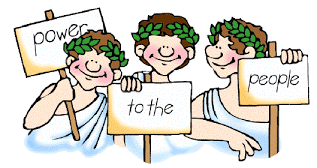
Well done Stirling Councillors! They have listened to the people and the referendum results and voted to change the way the Mayor is elected from by Councillors, to by the people, at last night’s council meeting.
Only Cr Italiano the former Mayor and Cr Caddy voted against the change. Cr Re was not there.
See article on the Stirling Times on-line by Linda Pond – Residents to elect next City of Stirling mayor.
At the last election on the 21st of October this year, electors were provided with information regarding the pros and cons of both methods of electing the Mayor and given the opportunity to have their say on how they Mayor should be elected. They overwhelmingly voted YES to change the system (about 70%).
A lot of the Councillors made some great speeches before voting on the decision last night, as summarized in the the article above, but Cr Andrew Guilfoyle’s final comments really drove it home. He simply said in his quiet manner, “whether we agree or not, we live in a democratic state” and “referendums mean something in this country” and that the “the people have spoken and they must be listened to”.
Democracy is not a perfect system, there is no such thing as a perfect political system and we will never have a perfect Mayor who will capable of appeasing everyone. But it is time to give this system of electing the Mayor a chance.
With the new system we will be effectively gaining another Councillor and therefore elector representation should improve slightly. With the current system the Mayor has had to try and be a ward Councillor as well as Mayor. This may be possible in smaller councils, but the City of Stirling is massive and the 7 wards are ridiculously large. Some of the wards have over 21,000 electors compared to other councils who’s Councillors only have to try and represent as few as 5,000 or less electors.
With the new system the Mayor will not be bogged down with one ward and have more time to focus on the whole City. The role of a popularly elected Mayor in the Local Government Act of WA;
LOCAL GOVERNMENT ACT 1995 – SECT 2.8
2.8 . Role of mayor or president
(1) The mayor or president —
(a) presides at meetings in accordance with this Act; and
(b) provides leadership and guidance to the community in the district; and
(c) carries out civic and ceremonial duties on behalf of the local government; and
(d) speaks on behalf of the local government; and
(e) performs such other functions as are given to the mayor or president by this Act or any other written law; and
(f) liaises with the CEO on the local government’s affairs and the performance of its functions.
(2) Section 2.10 applies to a councillor who is also the mayor or president and extends to a mayor or president who is not a councillor.
LOCAL GOVERNMENT ACT 1995 – SECT 2.10
2.10 . Role of councillors
A councillor —
(a) represents the interests of electors, ratepayers and residents of the district; and
(b) provides leadership and guidance to the community in the district; and
(c) facilitates communication between the community and the council; and
(d) participates in the local government’s decision-making processes at council and committee meetings; and
(e) performs such other functions as are given to a councillor by this Act or any other written law.
Some of the concerns about the new system are mentioned in the article, but a common objection is that popularly Elected Mayors may not get the support of Councillors because they didn’t get to choose the person. But sometimes many of them don’t get who they want the other way. From what we have seen in the past, not all Councillors support the Mayor elected by Councilllors. So this argument would probably only hold true if all, or nearly all, voted for the same person, but this isn’t always the case.
Opposing factions among Councillors can develop for many reasons, sometimes over a falling out over a single issue. Consider our federal political situation for example, members of the political parties vote to elect their leaders, but that doesn’t mean that all members will support the chosen leader. Perhaps if the people decided who should be Prime Minister they would have to be more respectful?
See this post titled Mayoral Machinations for a light hearted insight into how the election by Councillor system works, by a former Councillor who has experienced it over East.
At the end of the day the ratepayers expect the Mayor and Councillors to deal with each recommendation or motion put before them on their merits with the best interests of residents in mind, regardless of who raised them (the Mayor, another Councillor, staff or an Elector).
Hopefully residents will take more of an interest in their Local Government now that they can participate in choosing their own Mayor.
By Leisha Jack
